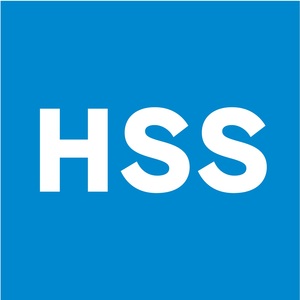NEW YORK, June 30, 2020 /PRNewswire/ -- An immunosuppressive drug approved to treat rheumatoid arthritis and neonatal-onset multisystem inflammatory disease may allow certain people with COVID-19 to avoid having to go on a ventilator, according to a small case study from investigators at the Hospital for Special Surgery (HSS). The drug, anakinra, appears to reduce the effects of systemic inflammation in people with COVID-19 who are in severe respiratory distress.
The study, published online-first in Arthritis & Rheumatology today, was led by Iris Navarro-Millán, MD, MSPH, a rheumatologist at HSS. At the height of the pandemic in New York City, Dr. Navarro-Millán was working as a hospitalist on a COVID-19 unit. She observed indicators that signified a patient was about to worsen quickly and hypothesized that these measures could suggest the best time to intervene with additional medication.
"In rheumatology, we take a very measured approach to treating each patient," said Dr. Navarro-Millán. "I applied those methods to develop specific criteria and determine markers that suggested patients were in this window of opportunity where they were most likely to benefit from an immune-suppressing drug."
"At the height of the pandemic, I was following the literature that was coming out about COVID-19 so that I could understand what was going on from an immunological point of view," explained senior author Mary K. Crow, MD, physician-in-chief and chair of the Department of Medicine at HSS. "We were all aware that people who needed ventilators were at high risk for fatality, so preventing them from getting to that point seemed like an important goal."
The two criteria identified as signals that a patient would soon require mechanical ventilation were acute hypoxic respiratory failure (AHRF) and cytokine storm syndrome (CSS). CSS, in which the immune system floods the body with proteins that promote inflammation and tissue damage, has been identified as the most dangerous consequence leading to fatality in people with COVID-19. AHRF was defined as an increased need for supplemental oxygen. Elevated levels of a blood marker called ferritin were used as an indicator of CSS.
In the paper, the investigators report that of the 11 patients who received anakinra after exhibiting signs of being close to requiring intubation and mechanical ventilation, those seven patients who received anakinra within 36 hours of increasing oxygen requirements were able to avoid mechanical ventilation and were later discharged home. In the four who did not receive anakinra until four or more days after the onset of respiratory failure, all were placed on ventilators, three were eventually extubated, with two of those patients discharged and one remaining hospitalized. One fatality was reported, of a patient who received anakinra and later went on a ventilator.
Since the COVID-19 pandemic began, a number of immunosuppressive drugs have been evaluated in patients experiencing CSS. Some of these drugs, including anakinra, inhibit a protein called interleukin-1. Other drugs being investigated inhibit different proteins in the interleukin family.
Dr. Navarro-Millán chose to study anakinra in part because the drug has a shorter half-life than other immunosuppressive drugs, enabling her to more readily customize the amount of the drug in the body. "We know that once someone does go on a ventilator, their risk of other infections, especially bacterial infections, goes way up," she said. "At that point, suppressing the immune system is not the best approach. When we stop anakinra, the immune system rebounds much more quickly than it does with other immunosuppressive drugs."
"This is a small study, but we think it could provide guidance to other doctors to help them identify which patients might benefit from anakinra treatment," Dr. Crow added. "For those showing evidence of CSS and increasing oxygen requirements, the timing of the intervention is essential in avoiding the need for intubation. We thought it was important to publish our experiences and get this information out and available, especially as the pandemic is worsening in other parts of the country."
Dr. Navarro-Millán is now developing a controlled study of anakinra in patients with COVID-19 who fit the criteria she developed.
About HSS
HSS is the world's leading academic medical center focused on musculoskeletal health. At its core is Hospital for Special Surgery, nationally ranked No. 1 in orthopedics (for the tenth consecutive year), No. 3 in rheumatology by U.S. News & World Report (2019-2020), and named a leader in pediatric orthopedics by U.S. News & World Report "Best Children's Hospitals" list (2019-2020). Founded in 1863, the Hospital has the lowest complication and readmission rates in the nation for orthopedics, and among the lowest infection rates. HSS was the first in New York State to receive Magnet Recognition for Excellence in Nursing Service from the American Nurses Credentialing Center four consecutive times. The global standard total knee replacement was developed at HSS in 1969. An affiliate of Weill Cornell Medical College, HSS has a main campus in New York City and facilities in New Jersey, Connecticut and in the Long Island and Westchester County regions of New York State, as well as in Florida. In addition to patient care, HSS leads the field in research, innovation and education. The HSS Research Institute comprises 20 laboratories and 300 staff members focused on leading the advancement of musculoskeletal health through prevention of degeneration, tissue repair and tissue regeneration. The HSS Global Innovation Institute was formed in 2016 to realize the potential of new drugs, therapeutics and devices. The HSS Education Institute is a trusted leader in advancing musculoskeletal knowledge and research for physicians, nurses, allied health professionals, academic trainees, and consumers in more than 130 countries. Through HSS Global Ventures, the institution is collaborating with medical centers and other organizations to advance the quality and value of musculoskeletal care and to make world-class HSS care more widely accessible nationally and internationally. www.hss.edu.
Contacts
Noelle Carnevale / Monique Irons / Tracy Hickenbottom
[email protected]
(212) 606-1197
SOURCE Hospital for Special Surgery

Related Links
WANT YOUR COMPANY'S NEWS FEATURED ON PRNEWSWIRE.COM?
Newsrooms &
Influencers
Digital Media
Outlets
Journalists
Opted In





Share this article